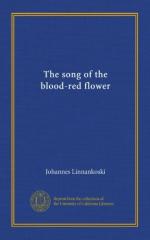voice?
“I do not know. I only know that my years of wandering are over now, and I have come to settle down in my own place. I may freely confess that I was weary and broken down, worn out and hopeless, when I came home—to see my mother for the last time, and follow her to the grave. And I cannot say, even now, that I am much better, though perhaps a little. I can feel something in me that seems to grow, something that gives me hope. So perhaps it is not altogether lost.
“I am building myself a house, and have other plans of a like sort. But there is one thing I miss, and the lack of it grows stronger every day: a friend and comrade, one that I could respect and trust entirely. Not one to share my good fortune, but one to be with me in toil and want.
“Kyllikki, you can never guess how I have suffered in doubt and questioning of late. Have I any right at all to hope for comradeship? Could I promise anything to anyone? And if so—to whom?... Kyllikki, you know me well enough to understand what I mean. It is no light question, and no easy one to answer.
“As far as I myself am concerned, I believe I see my way clear. And therefore I ask you—will you venture out upon the water with me once more—not the mere crossing of a little stream, but for a voyage that may lead we know not where? I cannot be sure that we should ever reach safely to land, only that if your hand is still free to give, and you are willing, and can trust me enough to offer it, then I will never let go, whatever may come.
“And one thing more—could
a daughter of Moisio venture to
share the lot of a poor settler?
I can offer nothing more, and
would not if I could.
If she will, then I can dare anything.
“Again—would you wish to join your life with mine? Or do you despise me, perhaps? I will not try to defend myself, and it would be useless in any case, for I know that little matters would not influence your decision; all must rest on what you think of me as a whole, and that is fixed already.
“One thing most of all—let there be no question of pity or giving out of charity. I fancy neither of us would ever give or take in that way, but I have heard say that pity counts for much in a woman’s heart. Myself, I do not think pity can go far, if the earlier feeling is once dead. And you know best yourself whether that is so.
“Is your father still alive? And does he still think as before? But it makes no difference now. Once we are agreed, ten fathers could make no difference. I feel now that I can do what I will.
“And that is all for now, Kyllikki. You know how anxiously I wait to hear from you—your answer means very much to me. But I know it will be clear and true, whichever way it may be. OLOF.
“My address is, Olof Koskela, as above.”




